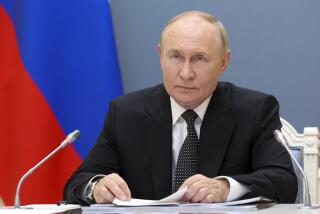Sense of Adventure Betrays Many
- Share via
MOSCOW — When “Lena” was 19, she and several other Russian women responded to a newspaper ad for a work-study program in China and flew off to the city of Jukhai for what she believed would be a cookery course and a job in a restaurant.
But the trip turned out to be Lena’s passage into what investigators call a “hellish world of crime and servitude”--a life of forced prostitution into which more and more Eastern European women are being channeled.
After a month, the women’s bosses took away their Russian passports and subjected them to beatings, hunger and imprisonment, according to Global Survival Network, or GSN, a nonprofit Washington-based organization formed in 1995. The bosses then suggested the women could “work” to buy back their passports--at $15,000 per document--in hotels, restaurants and karaoke clubs as “entertainers” and prostitutes.
Lena and her friends managed to run away but received no help when they complained to the Russian Consulate and Chinese city officials, according to a GSN account of their ordeal. Only after wandering around China for three months raising money by working as “hostesses” were they able to return home.
Lena’s experience is increasingly common, according to GSN and other international groups.
More women throughout the region are looking for work abroad, in response to rising unemployment, chaotic economic conditions and sexual discrimination at home. European Union estimates suggest that two-thirds of the 500,000 women trafficked for prostitution annually now come from Eastern Europe.
Gillian Caldwell of GSN cited U.N. estimates that the worldwide flesh trade rakes in $7 billion a year for organized crime groups, putting it on par with other illegal commerce in narcotics or guns.
But in Russia, there is little uproar about evidence that its women are being tricked into forced prostitution.
Few Russian officials showed up at an international conference on the problem last month in Moscow. Only the justice and labor ministries sent top-level delegates, conference coordinator Yuri Dzhibladze said.
“The situation in my opinion is fairly indicative of the lack of interest and preparation in our government and the ministries to deal seriously with this problem,” he said, in an oblique complaint about many Russians’ dismissive attitude toward women’s rights.
The conference featured a 42-minute documentary, “Bought and Sold,” the result of two years of research by GSN.
Its staff tracked the Russian organized-crime networks that now trade in women, and secretly filmed the corrupt police, model agency bosses and pimps who work in the trade.
The documentary showed how criminal groups, posing as employment and travel agencies, lure Russian women looking for better-paid work abroad into a horrifying life of isolation, beatings and forced sex. Women who try to seek help may be raped, locked up, beaten, starved and threatened with harm to their families, it found.
*
Lena, whose case was described in a separate report, escaped her captors but not her trauma. She said she finds it hard to trust anyone and keeps a gun for protection. She goes to a psychiatrist “because I became very jumpy.”
“My health is ruined,” Lena said. “I simply curse the day when my romantic notions made me decide, having trusted those people, to go to see China.”
“The international community has condemned this heinous crime through a convention that Russia has ratified--the Convention on the Suppression of Traffic of Persons and the Exploitation and Prostitution of Others,” said Michael Platzer of the Vienna-based U.N. Crime Prevention and Criminal Justice Branch.
But at the Moscow conference’s final news briefing, the Russian media seemed skeptical, focusing not on evidence about organized criminal involvement but on the question of guilt and complicity of the women trapped in the trade.
“Surely,” began one bearded questioner, “all those girls are really just asking for it?”
More to Read
Sign up for Essential California
The most important California stories and recommendations in your inbox every morning.
You may occasionally receive promotional content from the Los Angeles Times.













